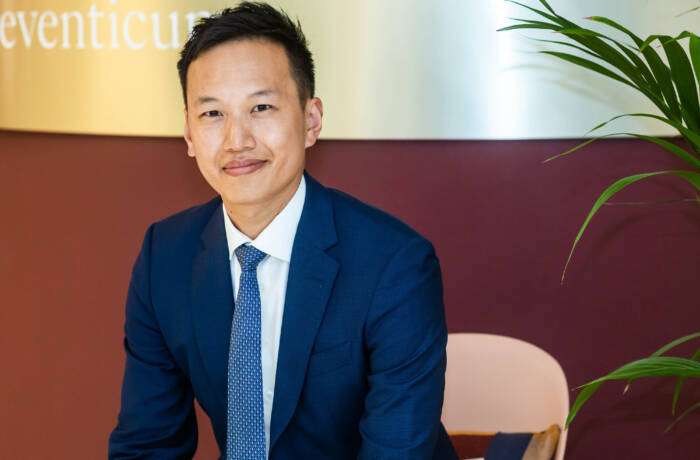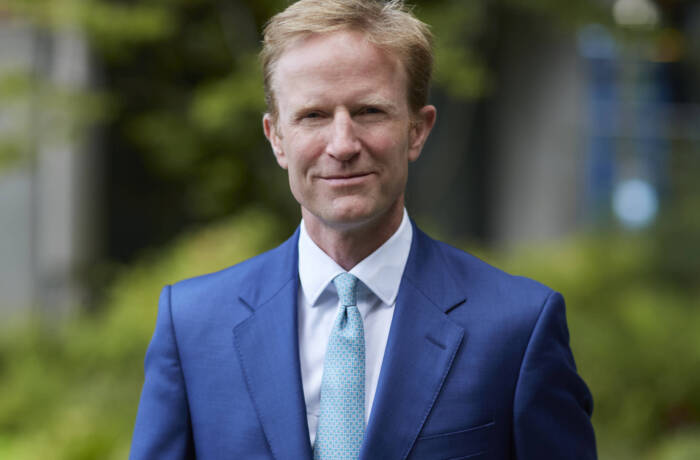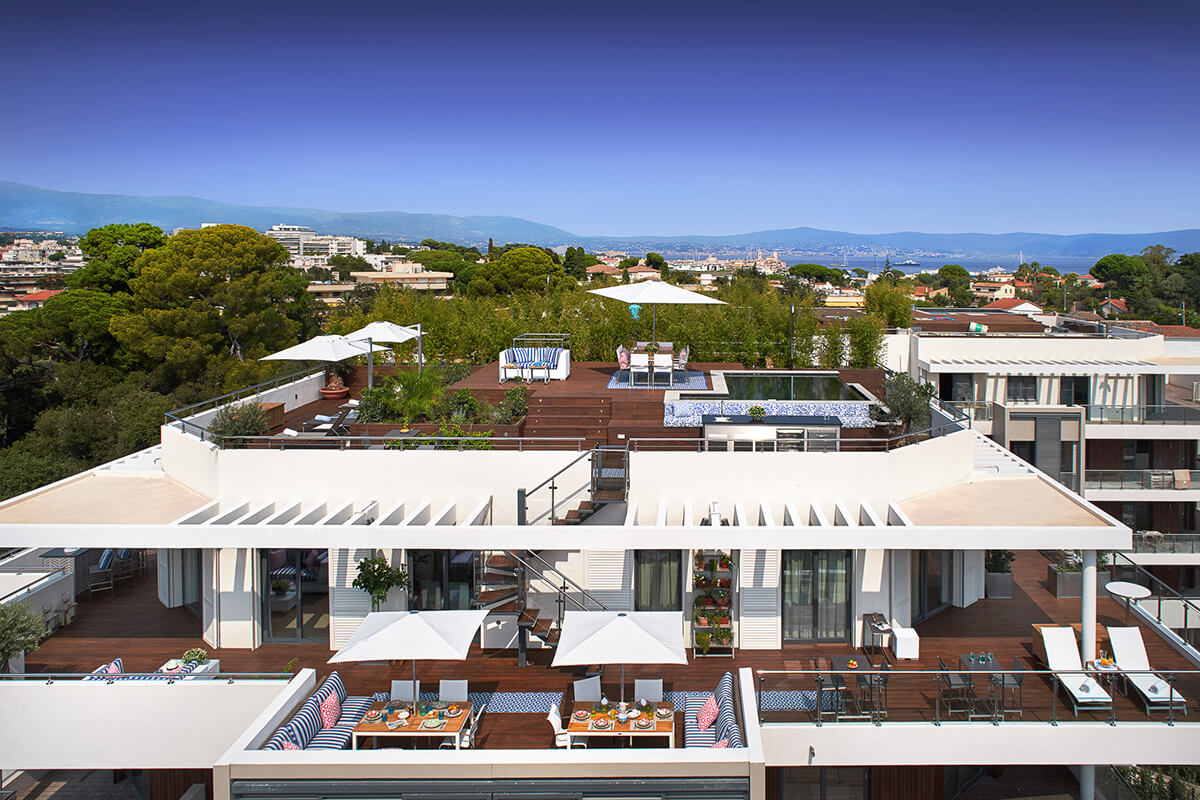
View from a penthouse in the Parc Du Cap development by the Caudwell Collection
In 2006 British entrepreneur John Caudwell sold his pioneering telecommunications company, the Caudwell Group, which included high-street mobile phone retail giant Phones4U, and turned his attention to property and philanthropy. His luxury residential development company, the Caudwell Collection boasts a portfolio of properties in prime locations across the UK and France whilst Caudwell Children is one of the leading charities in the UK for children’s disabilities. LUX Editor-in-Chief Darius Sanai speaks to the billionaire about real estate, Brexit and building a centre for autistic children

John Caudwell
LUX: You were known in the UK as one of the big mobile telephone entrepreneurs back in the 90s, 2000s, but now you are involved in property development. How did that happen and has high-end property always been one of your passions?
John Caudwell: I wouldn’t say it was a passion because for one thing I would never have had the money to exercise or endorse that passion, but I’ve always had a passion for beautiful things, especially beautiful architecture. So, my factory, for example, the Victorian tile factory, that was completely derelict until we took it over. We completely restored it and made it into a really fabulous headquarters for the business. So I guess I’ve always had that interest but not as a property developer, more in terms of developing properties for my own business use.
Then the crash happened, and it was almost impossible to find anywhere to put your money that was safer than under your bed, so you have mattresses stuffed full of £50 notes everywhere. The world was so fragile that you could not have any confidence that it was going to pull through and that your money was going to hold its value. So I decided to put my money into equities that I thought were resilient to a world collapse.
Follow LUX on Instagram: the.official.lux.magazine
LUX: What kinds of equities?
John Caudwell: So essential commodities and essential items, things that are always going to be there. For example, there’s always going to be farming, there’s always going to be land and water. Not so much oil these days because that’s a thing of the past, but there were items you could recognise that were probably going to be reasonably – not recession proof – but certainly collapse proof because they would always be needed. Of course even those things were fragile because everything took a big hit, but because commercial property had dropped in value enormously, I decided to start buying property that had long lease holds or even in some cases, shorter lease holds that I could develop and try and add extra value to. That’s how I got into property, but it wasn’t aesthetically pleasing or beautiful property, it was was purely to protect myself commercially. And it did quite a good job – I built up quite a good portfolio, it wasn’t meant to make a lot of money, it was meant to be a protectionist measure. But from that, agents who were having a tough time as you can imagine, came to us with various properties and people came to us with properties that I was actually interested in, things of beauty. For instance, one of the ones we bought was Provencal in the South of France.
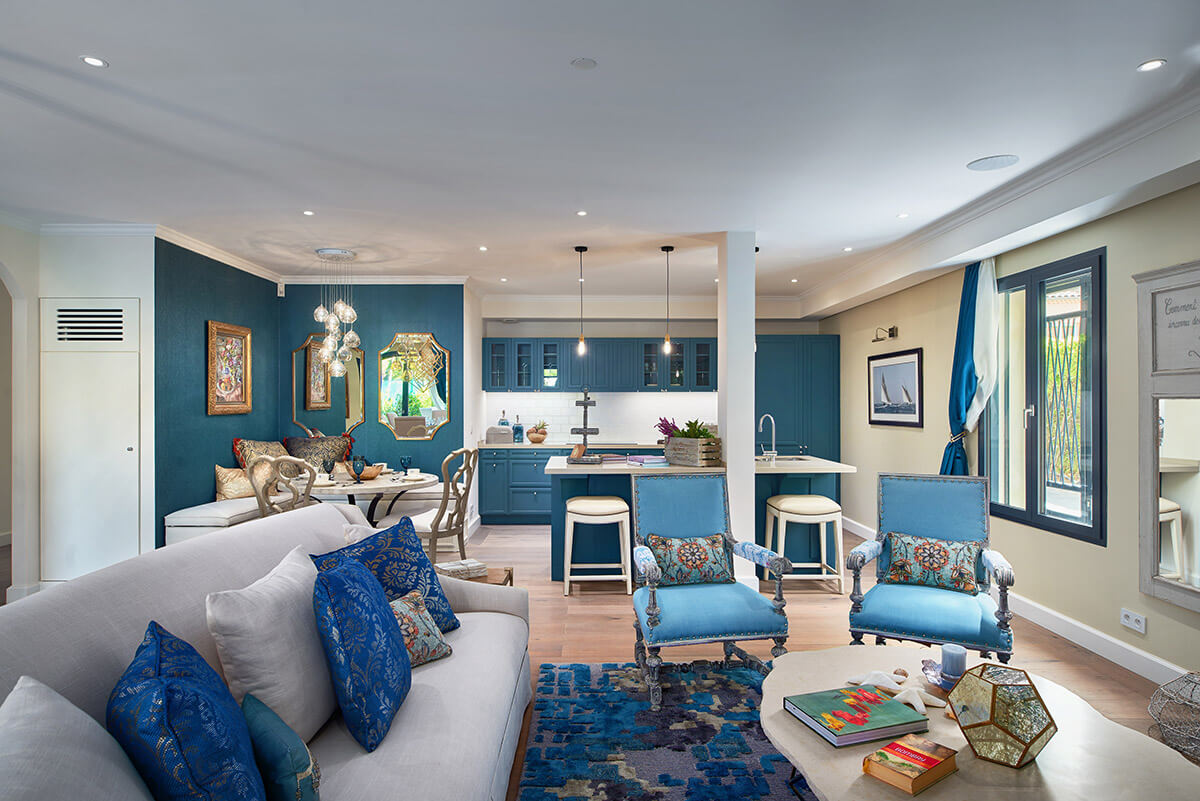
The living space in Les Oliviers by the Caudwell Collection
LUX: How’s the development going? Is there a scheduled completion date?
John Caudwell: In the South of France we’ve completed Parc du Cap – a luxury development with 88 1-4 bedroom apartments and penthouses, and Les Oliviers – 6 spacious apartments in a beautifully restored Art Deco building, both in Cap d’Antibes, and we’ve got other Caudwell Collection projects there as well, like Provencal. We’ve been working with the authorities to get Provencal to a point at which we believe it is developable – and after several significant challenges we’re now in a place to say work is fully underway to create 35-40 ultra high-end apartments there. We aim to launch in 2021-22. Over in London, with the Audley Square property, we’ve had to work very, very closely with Westminster council and the planners, and obviously everyone’s got their own angle but there’s been a real spirit of cooperation because everybody wants to see it happen. It’s good for the city because it turns an eyesore into a beautiful building, not to mention the jobs it creates through the building work.
Read more: Inside Lake Como’s luxury residence, Villa Giuseppina
LUX: And with the London developments, such as Audley Square, how did that come about?
John Caudwell: It came about as a result of us becoming aware of the site and contacting Nama, who were the people who held all the debt. You might know Nama as the Irish bank that took all the property debt? We ended up in a two-year negotiation with Nama on the site. It took a long time because there were a lot of fundamental problems with the site, there were a lot of risks at that time and the price they were asking for was too high. But eventually, whilst we were negotiating. we worked through some of the problems and did a whole range of due diligence exercises to try and assess and minimise the risk as well as reduce the price. Eventually, it got to a point where it was acceptable so we did the deal and then that was the start of all the work!
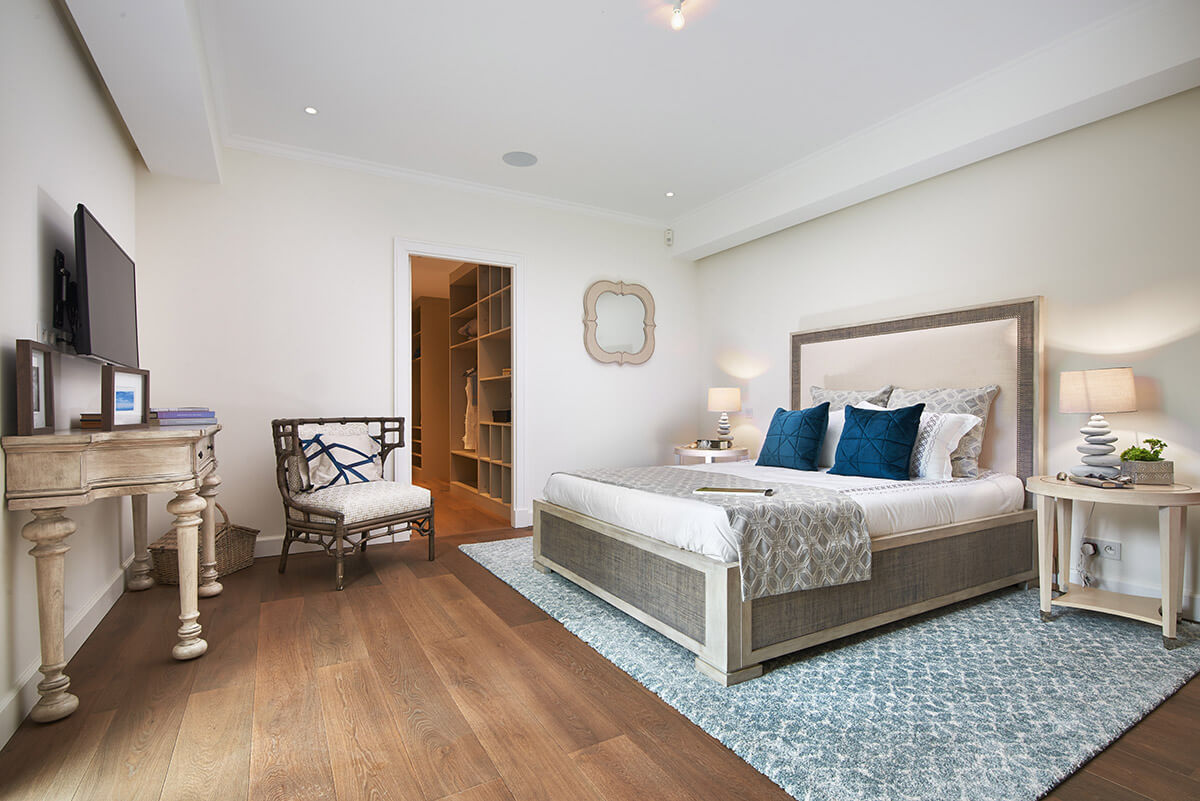
Les Oliviers was partly restored using local materials and products
LUX: The properties that you’re creating are very high-end, sophisticated, luxury – is there a plan to broaden the brand, the Caudwell Collection, beyond property?
John Caudwell: Well, we are already doing that partly, but depends on the success that we have and we do expect it to be extremely successful. But you know the situation in the UK at the moment is not so good with stamp duty, and the Brexit situation. I mean London is the powerhouse of the world, it’s a fantastic city and will remain a fantastic city – I am extremely positive about the future, but I am a bit concerned about the effect stamp duties have had on the market. I don’t disagree with it incidentally, I think it’s fair enough to raise all these huge sums of money from wealthy people who can afford very expensive properties, but it has damaged the property market. The non-doms, I don’t disagree with either, I don’t disagree with it from a moral point of view because I think the rich have to pay their appropriate share of the taxes, but it’s not good if you start losing very wealthy people who take their economic interests to other countries like Paris and New York and Monaco and so on. Those countries that welcome them, are then taking our livelihood away because those people, by being financially centric to London, also tend to then have a lot of their business interests in the UK and tend to be much more likely to have business centres in the UK.
Read more: Entrepreneur Adrian Cheng & leading architect James Corner are redesigning Hong Kong
And then of course Brexit as the next stage of that whereby I was very strongly pro-Brexit. I wanted a clean proper Brexit with a strong government and I said that when the Conservatives called the election, I said if there’s no other reason why the people vote Conservative, it needs to be to give the power to the party to negotiate a deal. And now where are we? Nearly two years down the line, we’ve got a very, very weak Conservative government with no majority, with a lot of back biting from within, with the house of Lords almost seeming to sabotage the position. I think, at the moment, it’s all very worrying because we needed a strong powerful Brexit or we needed to stay – we needed to either be properly in or properly out, not some horrible mishmash in the middle that doesn’t deliver the benefits. If we’re not careful we’re going to have all the pain of Brexit and limited benefits, which would be a fiasco. So, I am a bit concerned about that, it’s long answer to your question but the answer does relate to how far I see the Caudwell Collection going. And also, opportunities because opportunities like the Audley Square, that allow you to turn something that’s very, very ugly into a thing of beauty, or Provencal, which has been derelict for thirty years, but if we do what we’re planning to do there will become a most magnificent property, on par with some of the properties in Cannes. Those sorts of opportunities don’t come up every day and to be able to make those into a commercial success as well as an aesthetic success, is something that plays very much into my absolute ethos.
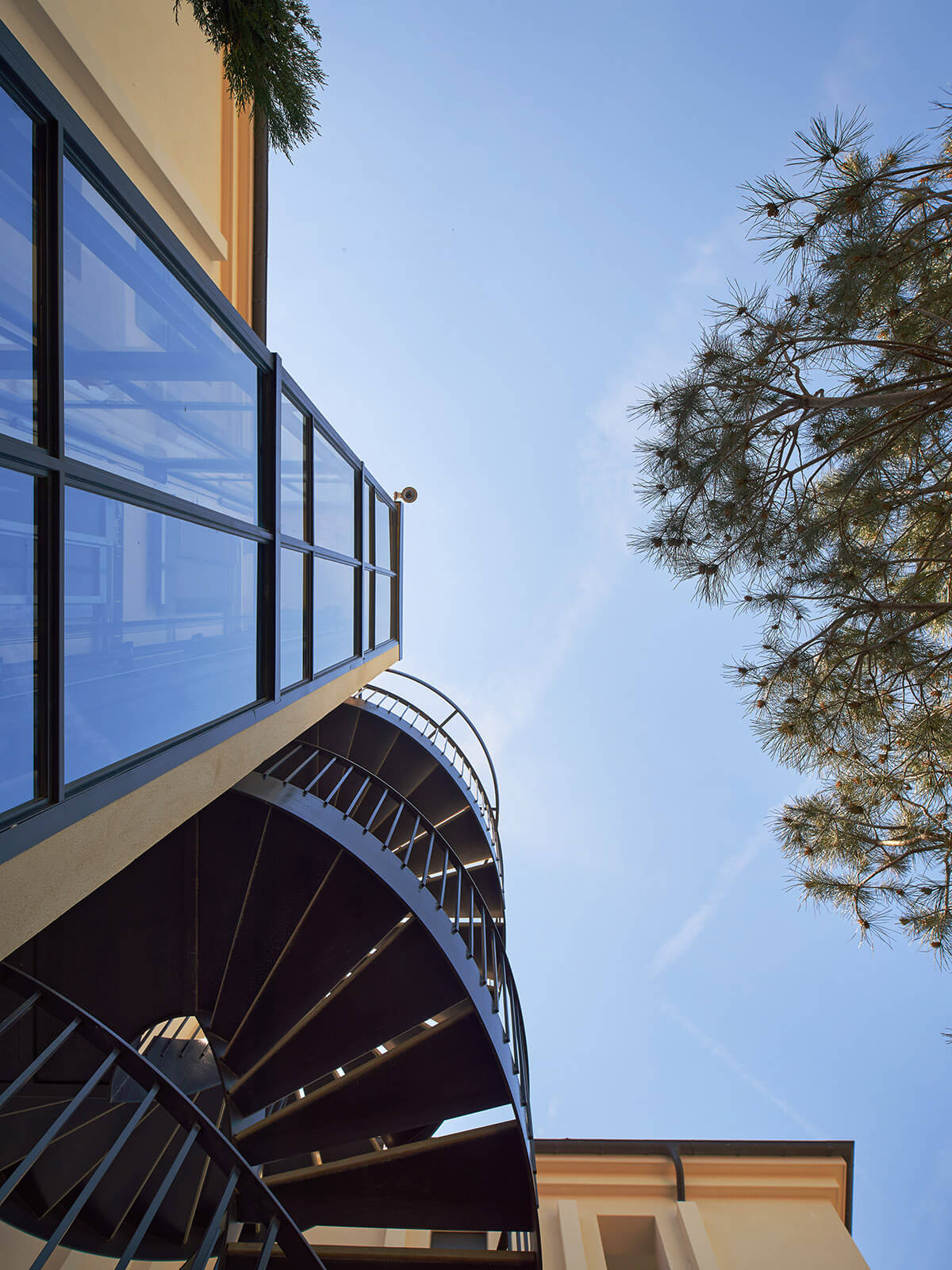
The original building façades of Les Oliviers were maintained during the development
LUX: Do you find this new business as consuming as Phones4u and your other previous companies? Or is it more of a side-line in terms of operating?
John Caudwell: Totally different. Phones4u was my life, my absolute life. Most people know of it because of the high street brand, but we were the world’s biggest in nearly every area in which we traded, which was accessories, hand set distribution, we even had our own in-house recruitment company with about 70 or 80 employees there, and we even recruited for other people. Same with security, we did our own security but then did it for other people, so we grew into what was a bit of an empire really, where several of my businesses were the biggest and best in the world. So, it was a complete and utter all-consuming thing, and also it was my entire wealth, so you know, fail at that and I would have been entirely broke, probably not totally broke, but I would have been broke.
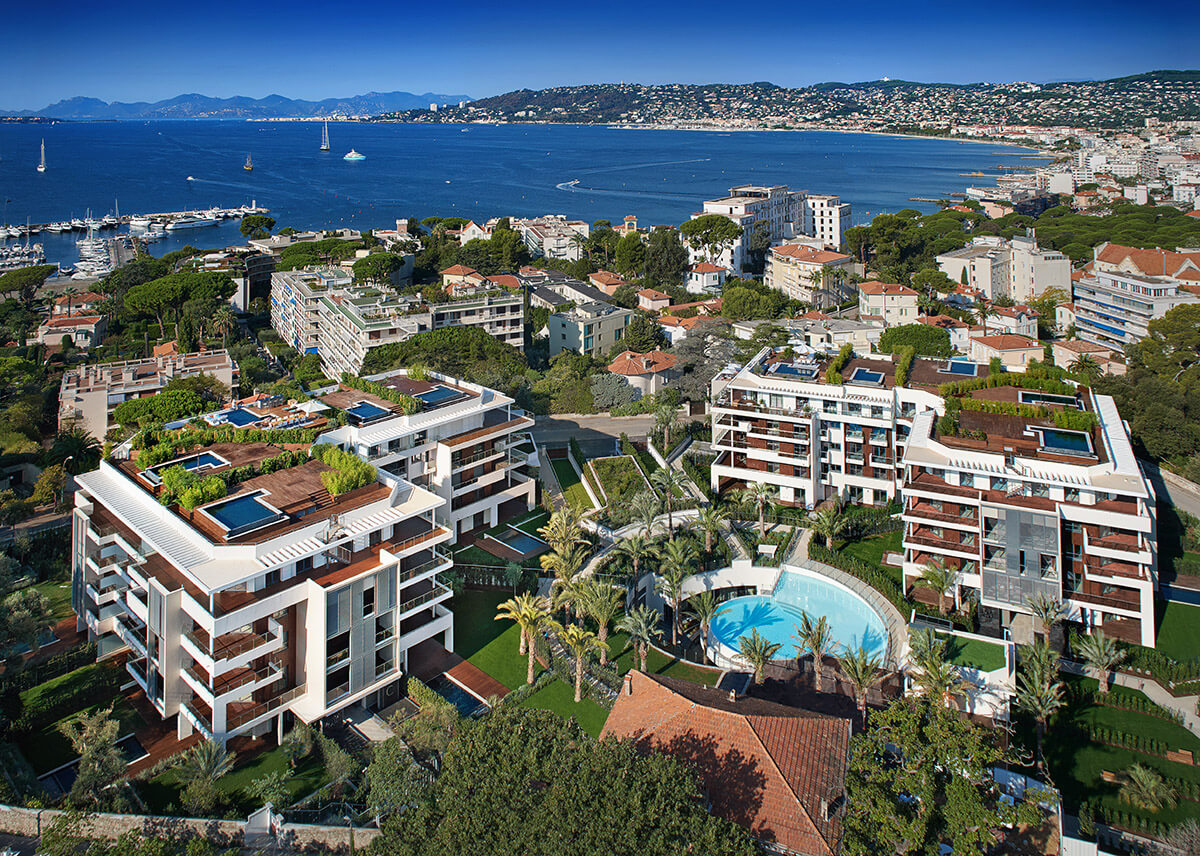
An aerial view of the Parc du Cap development
Succeed at that and then the result is the result that I got. But it was also extremely stressful, every minute of every day was extremely stressful, and I could never live that life ever again, nor would I want to, so that’s gone, and I am glad it has, but they were very special years. It’s different now, these businesses I didn’t need to do because my life now is all about philanthropy. But when they came along, and I saw them, I thought well, that’s a really interesting challenge. It gives me the opportunity to create a thing of beauty, put my stamp onto London with a building that’s going to be beautiful and timeless and make money as well. It’s a unique situation and a lot more pleasurable. I’ve got a great team of people who are helping me to run all of this and it’s a much more relaxed situation. I’m nowhere near as dedicated to it in terms of my time and effort because I have people who do that, but also its not as stressful and threatening as the mobile phone business was, which was ferocious, every minute of the day. That doesn’t mean its easy – it isn’t, we’ve got to be smart, we’ve got to be clever. Lots of problems to address and solve and we’ve got to create the vision of beauty that we promised.
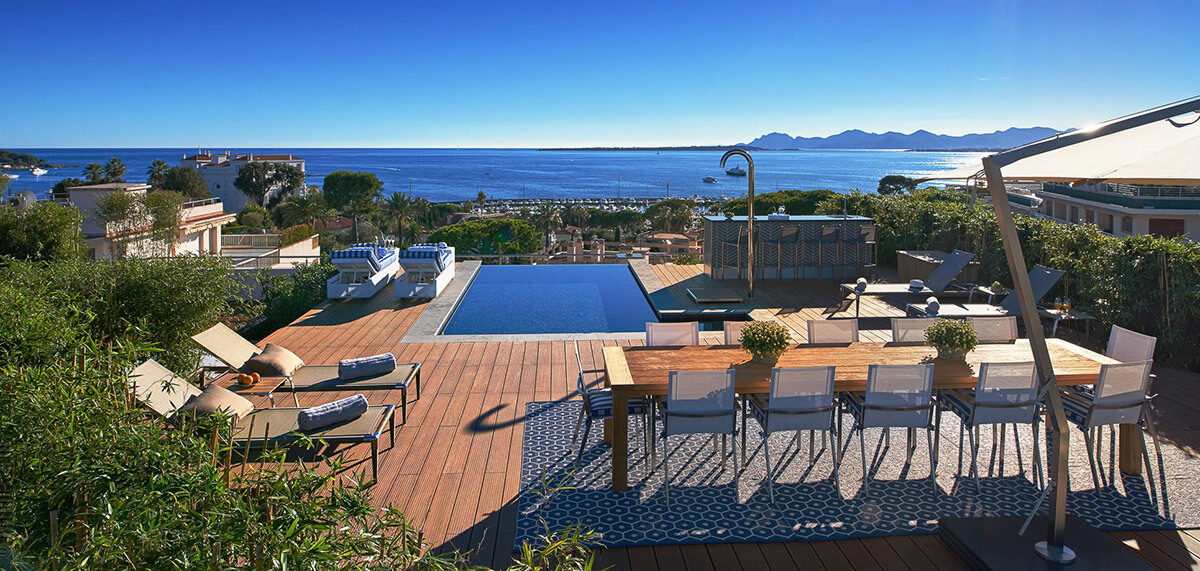
The view from a penthouse in Parc du Cap
LUX: How important is it for you that people talk about the Caudwell brand in relation to the properties you develop?
John Caudwell: The brand stands absolutely for quality. When people go to the Parc du Cap building, which is the one that I wouldn’t have built, but it is a beautiful, beautiful development, and most people who’ve visited it, say it feels quite pricey, and they understand why it is quite pricey, because the quality is exceptional for that coastline. And everybody says they’ve never seen another development of that quality which is quite nice to hear and that’s sort of part of the Caudwell collection brand. We got the same feedback with Les Oliviers it was the same feedback; it is a building that is really a fantastic quality throughout and is really desirable to live in, and that’s exactly what we’ll do with Provencal once we get started. We are creating these buildings of huge quality and recognisably of huge quality, it’s not just me saying it, but these properties stand the test of third parties too, whether they’re agents or buyers, everybody thinks they’re beautiful.
Read more: Caroline Scheufele on Chopard’s gold standard
LUX: There are parts of Les Oliviers that you restored, using local products and materials. Is restoration an important aspect of your developments?
John Caudwell: Our design approach with Les Oliviers was to carefully restore the original building façades and use some locally sourced materials including natural stone for the terraces and loggia floors, and Provencal limestone paving around the swimming pool. The quality of the finished product is exceptional – from the apartments fitted out with high tech features and contemporary yet classically inspired interiors through to the beautifully manicured Provencal style gardens. You can’t necessarily use local materials all the time and of course it’s a commercial venture, so I don’t put local materials as the priority but what I do put as the priority is that it must be as environmentally friendly as possible. For instance, with Audley Square, we’ve put geothermal in, and I’ve just put geothermal into my house. The whole point is to try cut down on pollution and energy loss.
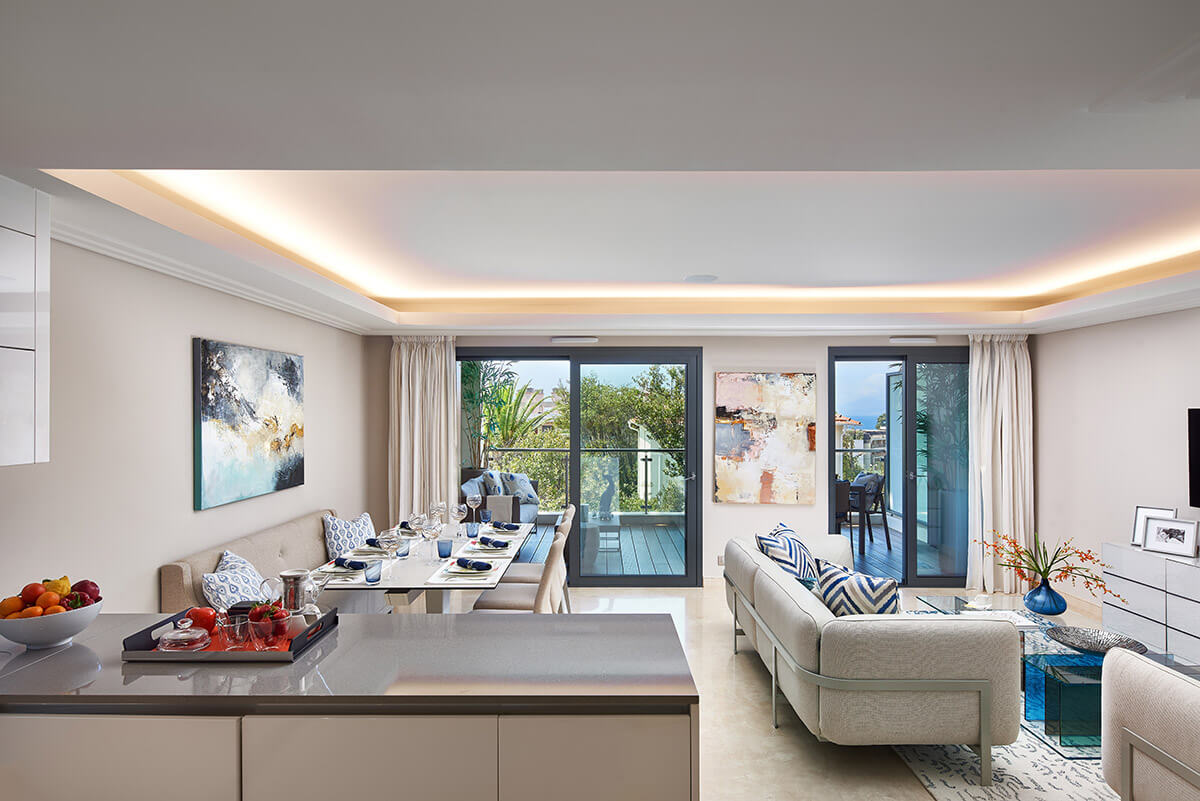
The living room in one of the two bedroom apartments in Parc du Cap
LUX: Finally, can you tell us more about your philanthropic work and in particular, the Caudwell Children.
John Caudwell: That’s extremely exciting because we help children with 600 different illnesses. During the 18 years that we’ve been running, we’ve had more applications from parents with autistic children than any other category, in fact we’ve had so many applications that 50% of the work we do is with autistic children. We developed methods of intervention that have helped thousands and thousands of children and their families live a better life. Of course, autism is an extremely broad condition; it’s the families of autistic children that have difficulties managing and coping emotionally and physically and that’s where we’ve focussed our effort over the years.
There are around 700,000 people on the autism spectrum in the UK, so the task I gave to my chief executive was how to find more and more children and how to change the medical profession’s understanding of and attitude towards autism. We believe we can substantially help to improve the lives of autistic children and we’ve done it many, many times, but people who wish to be cynical could say that the autistic child would have carried on, on that developmental path anyway, so what you’ve done has made no difference because the child may have made that progress without you. So we’ve built this centre and are putting a big team of medical people in there to prove to the medical authorities that we can intervene in autism and that we can improve the lives of autistic children. When the centre opens in the next couple of months, we’ll still carry on the work for all the other children as well but the focus will be on autism. And if we can change the NICE guidelines to read differently, then doctors around the country, instead of diagnosing an autistic child and saying to the parents, ‘I’m sorry there’s absolutely nothing we can do, just go home and do the best you can with your child and keep your child safe and healthy’, they’ll be able to say, there is help you can get and this is what can be done and this is who you might go to and this is the way you can improve your child’s life.
To view the Caudwell Collection’s portfolio of luxury properties visit: caudwellcollection.com
For more information on Caudwell Children visit: caudwellchildren.com

